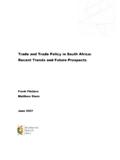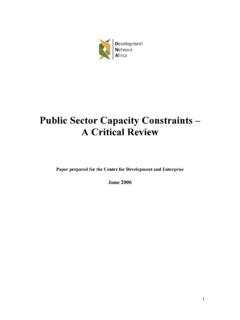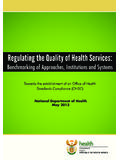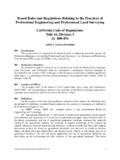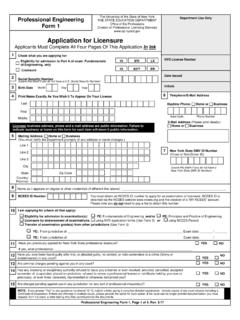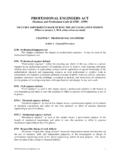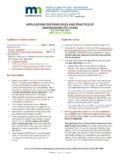Transcription of SA Professional Services - DNA Economics
1 Professional Services in South Africa Accounting, engineering and law 25 January 2009 4th Floor, South Office Tower, Hatfield Plaza, 1122 Burnett Street, Hatfield, Pretoria, 0083, South Africa PO Box 95838, Waterkloof, 0145, South Africa Tel +27 (0)12 362 0025 | Fax +27 (0)12 362 0210 | Email | Company Registration: 2001/023453/07 Directors: Gareth Ochse, Elias Masilela, Matthew Stern ACKNOWLEDGEMENTS This report and a parallel survey were commissioned by the Word Bank. We would like to express our appreciation to the staff of the Bank for the advice and assistance they have provided over the course of this study.
2 We would also like to thank the many associations, professionals and students that provided information; and Alex Giannaros for his efforts in arranging and conducting most of the interviews. AUTHORS Niall Condon Matthew Stern Sarah Truen TABLE OF CONTENTS 1 Professional Services IN SOUTH AFRICA .. 1 Introduction .. 1 The role of Professional Services in South Africa .. 2 2 MARKET STRUCTURE AND PERFORMANCE .. 5 Size and distribution .. 5 Fees and wages .. 6 Foreign involvement and investment .. 11 3 MARKET FOR PROFESSIONALS .. 13 The need for skills.
3 13 Entry requirements .. 17 4 INTERNATIONAL COMPETITION AND TRADE .. 19 The flow of professionals .. 19 Education, registration and standards .. 19 Immigration policy and performance .. 21 The regional dimension .. 24 5 CONCLUSION AND POLICY RECOMMENDATIONS .. 26 Figure 1: Consulting engineering annual fee income (Rm 2000 prices) .. 3 Figure 2: Accounting salary comparison .. 9 Figure 3: Accounting salary comparison adjusted for cost of living .. 9 Figure 4: Lawyer salary comparison (R 000) .. 11 Figure 5: Lawyers salary comparison adjusted for cost of living.
4 11 Figure 4: Number of practising Attorneys 1999-2009 .. 16 Figure 5: Number of Attorneys by race 2007 .. 16 Figure 6: Maths graduates at secondary level in 2006 .. 17 4th Floor, South Office Tower, Hatfield Plaza, 1122 Burnett Street, Hatfield, Pretoria, 0083, South Africa PO Box 95838, Waterkloof, 0145, South Africa Tel +27 (0)12 362 0025 | Fax +27 (0)12 362 0210 | Email | Company Registration: 2001/023453/07 Directors: Gareth Ochse, Elias Masilela, Matthew Stern Table 1: Total income in accounting, engineering and law in 2006 .. 2 Table 2: ECSA Registered engineering Professionals.
5 3 Table 3: SAICA membership, October 2009 .. 4 Table 4: International comparison of chemical engineering salaries, US$ and PPP .. 7 Table 4: Hourly rates charged by legal professionals in South Africa .. 10 Table 6: Vacancies in accounting Services .. 14 Table 7: Average annual net migration, 2001-2003 .. 19 World Bank Professional Services in South Africa 1 1 Professional Services IN SOUTH AFRICA Introduction The apartheid government made substantial but racially selective investments in education, which gave rise to a class of highly qualified but largely white professionals.
6 In the postB1994 era, this has created both opportunities and challenges. On the one hand, the country is blessed with a strong base of engineers, accountants and lawyers. On the other hand, all three professions are under immense pressure to transform,1 and this has caused high levels of uncertainty and net emigration. In two of the three sectors, this has contributed to a widening skills shortage. The strength and sustainability of these professions in South Africa will largely depend on their ability to address the unique challenges that arise from South Africa s history, while simultaneously maintaining international quality standards and Professional recognition.
7 Whereas these two objectives are not necessarily in conflict, there is some risk that a strong focus on internal transformation may contribute to increased barriers to entry for external firms and professionals (or may slow the opening of these sectors to international competition). And this may limit the potential gains from increased trade and knowledgeBsharing in this sector, particularly within the SADC region. This paper reveals that such concerns are not misplaced; at least in the engineering and accounting professions. In these two sectors, it is remarkably difficult for SADC professionals to work in South Africa, largely because little or no recognition is given for past training and experience.
8 In law, some preferences are given to some African countries, but most foreigners are required to retrain from undergraduate level in order to practice in South Africa. Not surprisingly, there is little evidence of inward migration and most of the SADC professionals interviewed indicated that it is difficult to find work in South Africa. For foreign (largely African) students training in South Africa, a new set of barriers emerge. In the legal and accounting professions, graduates must undergo two years of articles before they can qualify as an attorney or accountant.
9 Access to such positions is limited and black South African students inevitably receive preference. Similarly engineering students, particularly in the universities of technology, report difficulties in finding industrial placements for their experiential training year, with many students being unable to complete their diploma for lack of this work experience. Thus despite the apparent opportunities to train and work in South Africa, especially for wellBeducated individuals from neighboring or nearby African states, it is remarkably hard for them to enter this market.
10 A fact confirmed by this project: we struggled to find sufficient foreign engineers, accountants and lawyers to interview. In the legal profession, where domestic supply seems to outstrip (or at least satisfy) demand, these barriers are relatively harmless. But in both the engineering and accounting professions, where South Africa faces severe skills shortages and net emigration, existing policies and restrictions are costly and in some instances unnecessary. 1 By 2009, the percentage of black professionals in the accounting, engineering and legal professions remain very low, at12%, 24% and 21% respectively.
